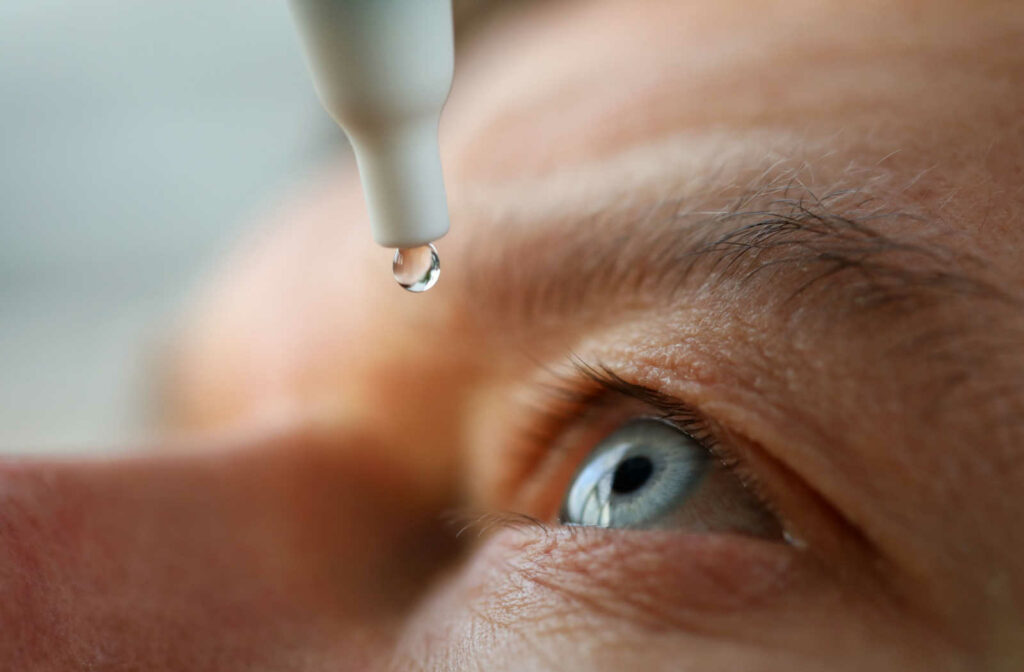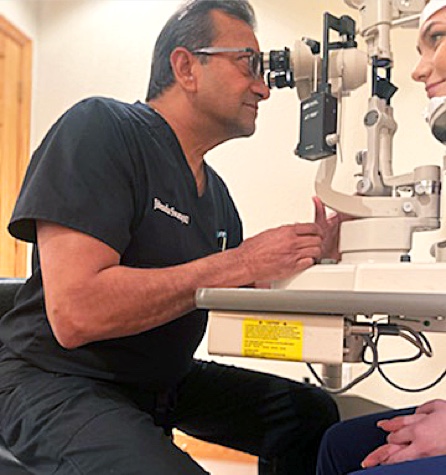Eye Drops for Cataract Surgery
After any eye surgery, patients can expect various instructions to help promote healing. Of course, rest is the most common recommendation after surgery. But eye drops are also essential in post-operative care, whether you’re a candidate for traditional or LenSx laser cataract surgery.
Cataract surgery patients receive eye drops immediately and consistently after their procedure. But which eye drops will your eye care team prescribe? What are the best medications for your eye care needs?
What Is Cataract Surgery?
A cataract is a cloudy or opaque area that develops on the lens. The lens or crystalline lens is a transparent, biconvex structure (rounded outward on both sides) located behind the iris. The lens changes shape to focus light entering the eye.
When the lens is clouded, the lens can’t accurately control light. So instead of focusing on the retina, light scatters within the eye, causing vision problems.
Changes to the lens’s proteins and fibers occur naturally due to aging, typically affecting adults over 40. However, other health and environmental factors can also cause changes to the lens.
While there are methods for temporarily improving vision, such as prescription lenses, the only way to remove a cataract is through surgery. The eye’s natural lens is removed and replaced with an intraocular lens (IOL) implant.
Mono-focal lenses are a common choice. However, there are also premium lenses that provide additional vision benefits.
Generally, cataract surgery is effective and is considered one of the safest types of surgeries performed in the US.

Post-Operative Eye Drops
Regardless of the type of cataract surgery, eye drops are an essential part of post-operative care. As your eyes are more vulnerable to complications, your eye doctor will prescribe:
- Antibiotic eye drops to prevent infection
- Anti-inflammatory eye drops to control inflammation
Typically, patients use eye drops for at least one month after cataract surgery. During the first week, the patient must apply eye drops several times daily. It’s crucial to use eye drops as prescribed to protect your eye health.
An initial follow-up is scheduled one day after the procedure, but additional follow-up appointments will also occur. Your eye doctor will provide individualized instructions for continuing eye drops at that time. Depending on your recovery, your eye doctor may recommend continuing eye drops to reduce inflammation or decrease dry eye symptoms.
There are 3 types of eye drops that support eye health after cataract surgery:
- Antibiotic eye drops
- Anti-inflammatory eye drops
- Lubricating eye drops
Antibiotic Eye Drops
Although bacterial infection after cataract surgery is rare, it can cause severe harm. Antibiotic eye drops help eliminate harmful bacteria to prevent and reduce the risks of complications.
The most commonly prescribed antibacterial eye drops are 4th generation fluoroquinolones, namely gatifloxacin and moxifloxacin. Generally, these 2 are considered the most effective and protect from a wide range of potential pathogens.
Anti-Inflammatory Eye Drops
Inflammation is a defensive immune response and is necessary for healing. However, too much inflammation can negatively affect tissue and interfere with function. Anti-inflammatory eye drops reduce inflammation to help control the healing process.
NSAIDs (non-steroidal anti-inflammatory drugs) in eye drops can help reduce swelling. They are also considered pain-relieving eye drops and can help make patients more comfortable during recovery. Most people are likely familiar with common over-the-counter NSAIDs such as aspirin, ibuprofen, and naproxen.
Although NSAIDs generally have fewer side effects than corticosteroids, there are risks associated with long-term use and potential drug interactions. Discussing your medications with your eye doctor is crucial for managing use appropriately. When prescribed or recommended by your eye doctor, NSAIDs can prevent complications.
Lubricating Eye Drops
Artificial tears or lubricating eye drops help relieve dry eye symptoms. Generally, dry eye after cataract surgery is temporary, with symptoms decreasing after one month. Most over-the-counter (OTC) artificial tears are effective for short-term dry eye treatment.
Many OTC eye drops use multi-dose packaging, which uses preservatives to prevent contamination. However, the preservatives combined with long-term use can cause adverse effects, including an allergic response or toxic reaction. Notably, your eye drops for dry eye can cause or aggravate dry eye.
Preservative-free eye drops are a safer, more effective long-term option when your dry eye is severe or chronic. Preservative-free eye drops use single-dose packaging to prevent cross-contamination. Talk to your eye doctor if you’re using artificial tears consistently, as they can recommend options, including preservative-free.
Cataract surgery patients may also benefit from prescription eye drops for dry eye. Examples of prescription eye drops include:
- Cyclosporine eye drops: Cyclosporine is prescribed to increase tear production by reducing swelling (inflammation). The eye drops are applied twice daily, 12 hours apart. The eye drops are available in a multi-dose container or single-use.
- Lifitegrast eye drops: Lifitegrast minimizes inflammation to improve symptoms of dry eye. The eye drops are only available in single-use containers. Lifitegrast eye drops are applied twice daily, 12 hours apart.
Follow Your Eye Doctor’s Advice
Countless over-the-counter and prescription eye drops are available, and many are effective for most patients. However, your eyes are unique, and sometimes what works for the majority may not benefit you. The best eye drops are the ones prescribed by your eye doctor. At Albemarle Eye Center, we get to know you and your eye needs. Personalized recommendations for eye drops help you achieve the best possible results. Contact us if you have questions about using eye drops after cataract surgery.

















